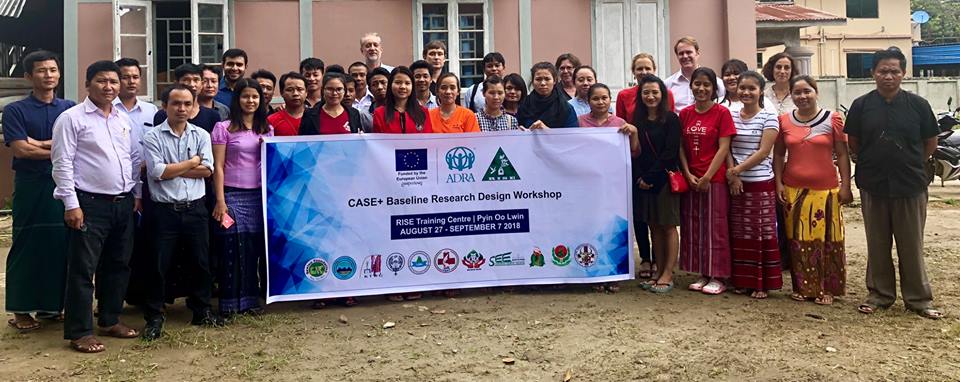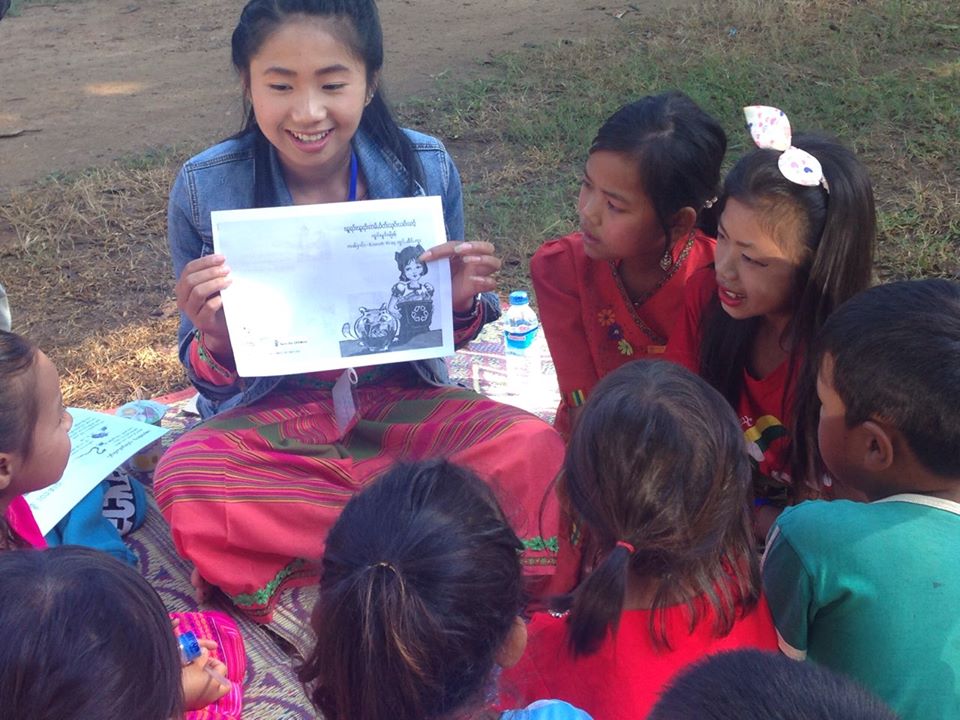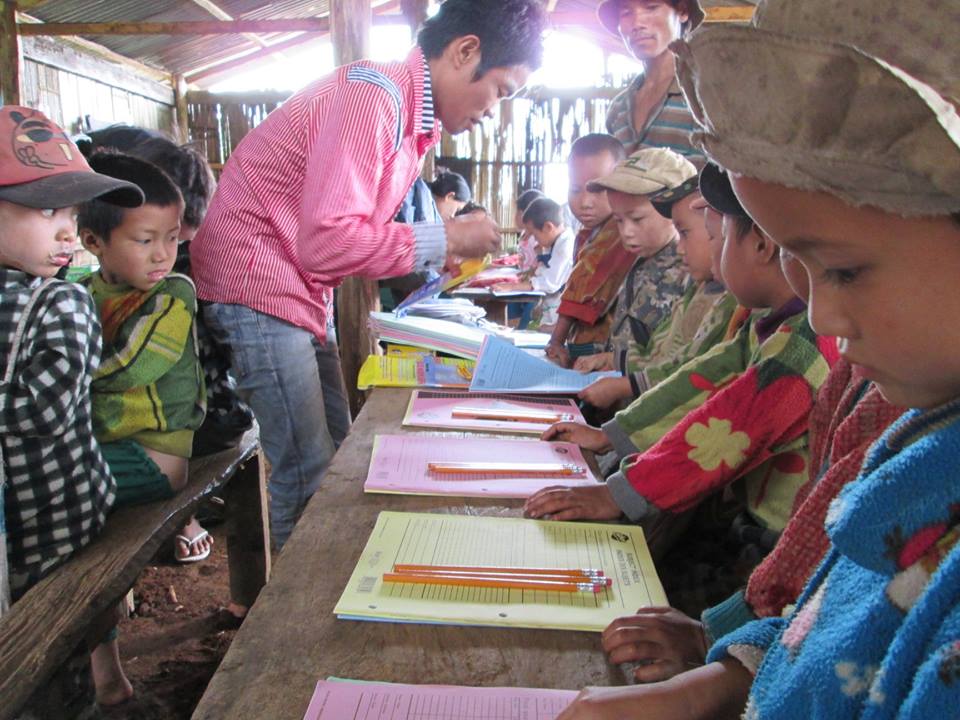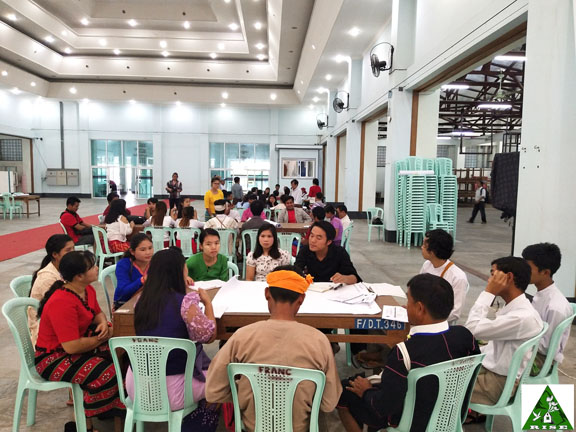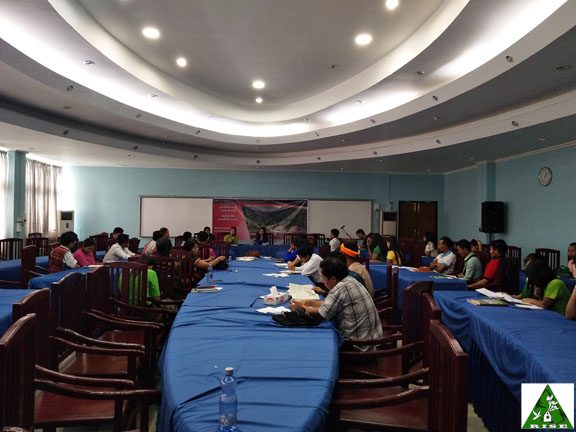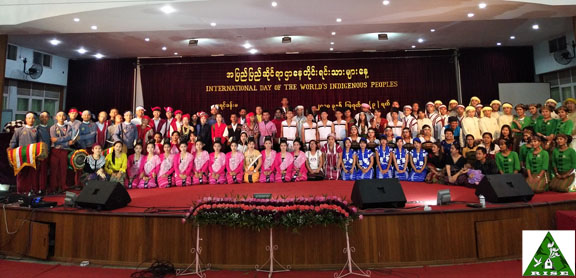(ႏိုက္ဂ်ီးရီးယား႒ာေနတိုင္းရင္းသားဘာသာစကားအေၾကာင္းေလ့လာစာတမ္းျပဳခ်က္- အန္တိုနီ အယိုဒီလီ အိုလာအိုယီ)
A Case Study of Nigerian Linguistic Situation
Anthony Ayodele Olaoye -Department of Linguistics, University of Abuja
အက်ဥ္းေကာက္ႏွဳတ္ခ်က္
႒ာေနတိုင္းရင္းသားဘာသာစကားမ်ားသည္ လူသားမ်ိဳးႏြယ္စုတိုင္းအတြက္ မရွိမျဖစ္သည့္အရာတစ္ခုျဖစ္သလို ဆက္လက္ထိန္းသိမ္းရမည့္ ယဥ္ေက်းမွဳအေမြအႏွစ္တစ္ခုျဖစ္သည္။ လူမ်ိဳးတစ္မ်ိဳး၏ဖြံ ့ျဖိဳးတိုးတက္ေရးသည္ ႏိုင္ငံအတြင္းတြင္ေနထိုင္သည့္ႏိုင္ငံသားတစ္ဦးခ်င္းစီ၌ျဖစ္တည္လာသည္။ ႏိုင္ငံသားတစ္ဦးခ်င္းစီမွတစ္ဆင့္ ပညာေရး၊ လူမွဳေရး၊ ႏိုင္ငံေရး၊ စီပြားေရးႏွင့္ ယဥ္ေက်းမွဳမ်ားကို အစိုးရေအဂ်င္စီမ်ားအား လုပ္ထံုးလုပ္နည္းေပၚလစီမ်ားျပ႒ာန္းရာတြင္အမ်ိဳးမ်ိဳးကြဲျပားျခားနားသည့္႒ာေနတိုင္းရင္းသားဘာသာစကားမ်ားမွတစ္ဆင့္ အျပန္အလွန္အက်ိဳးျပဳေပးႏိုင္သည္။ ဤအဆိုတင္သြင္းခ်က္အေပၚအေျခခံကာ စာတမ္းျပဳစုသူအေနျဖင့္ ႏိုက္ဂ်ီးရီးယားႏိုင္ငံတြင္ လက္ရွိသံုးႏွဳန္းေျပာဆိုေနၾကသည့္႒ာေနတိုင္းရင္းသားဘာသာစကားမ်ားသည္ ဒီမိုကေရစီအေရး၊ နည္းပညာပိုင္းႏွင့္ ကမၻာလံုးဆိုင္ရာဘာသာစကားမ်ားအတြက္ အဓိကက်သည့္အခန္းက႑တြင္ပါဝင္ေနပါသည္။ သို ့လင့္ကစား မိခင္ဘာသားစကားအားလက္ေတြ ့အသံုးျ႔ပဳေျပာဆိုရာ၌ စိန္ေခၚမွဳမ်ားစြာရွိေနပါသည္။ အဓိကျပသာနာမွာ သတ္ပံုသတ္ညႊန္းမလံုေလာက္ျခင္းႏွင့္ လူနည္းစုဘာသာစကားအမ်ိဳးအမည္ေပါင္းမ်ားစြာရွိျခင္း၊ ထို႒ာေနတိုင္းရင္းသားဘာသာစကားအားသံုးစြဲေျပာဆိုမွဳနည္းပါးလာျခင္းႏွင့္ဖ်က္ဆီးခံလိုက္ရျခင္း၊ ႒ာေနတိုင္းရင္းသားဘာသာစကားမ်ားေပ်ာက္ကြယ္လုနီးပါးအေျခအေနမ်ားရင္ဆိုင္ေနရျခင္းတို ့ေၾကာင့္ျဖစ္သည္။
မိတ္ဆက္
မိခင္ဘာသာစကားသည္ လူ ့ယဥ္ေက်းမွဳတစ္ခုမွတ္ေက်ာက္တင္ရာတြင္ လူသားမ်ားျဖစ္တည္လာမွဳကိုသိရွိႏိုင္ရန္ မရွိမျဖစ္လိုအပ္သလို ဝိုင္းဝန္းထိမ္းသိမ္းၾကရန္အတြက္လည္းအေရးၾကီးပါသည္။
ဘာသာစကားတစ္ခုသည္ လူသားမ်ား၏ႏွဳတ္ဖ်ားႏွင့္ေသာ္လည္းေကာင္း၊ အကၡရာသေကၤတမ်ားႏွင့္ေသာ္လည္းေကာင္း တစ္ဦးမွတစ္ဦးသို ့ ဆက္သြယ္ေျပာဆိုရာအတြက္ အသံုးျပဳၾကသည္။ ဘာသာစကားတစ္ခုသည္ ယဥ္တစ္စီးသဖြယ္လူမ်ိဳးတစ္မ်ိဳး၏ယဥ္ေက်းမွဳအားေပါင္းကူးပို့ေဆာင္ေပးသည္။ ဒါသည္လည္း လူမွဳပတ္ဝန္းက်င္အတြက္ မရွိမျဖစ္အေရးၾကီးဆံုးအရာျဖစ္ကာ ထိုလူမ်ိဳးတစ္မ်ိဳး၏ဝိေသသလကၡဏာျဖစ္သည့္ ယဥ္ေက်းမွဳ၊ လုပ္ငန္းေဆာင္တာမ်ားႏွင့္ စြန္ ့စားတီထြင္မွဳမ်ားအတြက္ တန္ဖိုးထားထိန္းသိမ္းရန္ျဖစ္လာေတာ့သည္။ ဘာသာစကားသည္ အျခားသတၱႏွင့္မတူပဲတတ္သိလိမၼာမွဳအား ဘာသာစကားေျပာဆိုသံုးစြဲျခင္းျဖင့္အကဲျဖတ္ႏိုင္သည္။ လူသားယဥ္ေက်းမွဳတစ္ခု၏အထိေရာက္ဆံုးယႏၱယားသည္ ထိုလူမ်ိဳး၏မိခင္ဘာသာစကားျဖစ္သည္။ ႒ာေနတိုင္းရင္းသားဘာသားစကားမ်ားသည္ ကြ်ႏု္ပ္တို ့လူသားမ်ားအတြက္ ယဥ္ေက်းမွဳႏွင့္ကိုယ္ပိုင္ဝိေသသလကၡဏာ၏အဖိုးမျဖတ္ႏိုင္သည့္လူ ့ယဥ္ေက်းမွဳတန္ဖိုးျဖစ္သကဲ့သို ့ လူသားမ်ား၏သမိုင္းအညႊန္းကိန္းႏွင့္ထိုလူသားမ်ားမည္သူမည္ဝါျဖစ္ေၾကာင္းအညႊန္းကိန္းမ်ားကိုအဓိကေဖၚျပေပးသည္။
၂. အမ်ိဳးသားဖြံ ့ျဖိဳးတိုးတက္ေရး
အမ်ိဳးသားဖြံ ့ျဖိဳးတိုးတက္ေရးအား ေစာင့္ၾကည့္ေလ့လာရာတြင္ ထိုလူမ်ိဳးမ်ားမွမည္ကဲ့သို ့ဘဝအဓိပၸါယ္ရွိစြာေနထိုင္သြားႏိုင္ရန္အတြက္ အဓိကအရင္းအျမစ္တစ္ခုျဖစ္သည္။ ဖြံ ့ျဖိဳးတိုးတက္ေရးအားတိုင္းတာရာတြင္ ပညာေရး၊ ႏိုင္ငံေရး၊ စီးပြားေရး၊ သိပၸံႏွင့္နည္းပညာမ်ားတိုးတက္ျဖစ္ထြန္းမွဳႏွင့္တိုင္းတာၾကသည္။ ပညာေရး၏လုပ္ငန္းအဆင့္ဆင့္မွာေတာ့ မိခင္ဘာသာစကားသံုးစြဲေျပာဆိုျခင္းျဖင့္ မည္သည့္လုပ္ငန္းအစီအစဥ္မ်ား၊ မည္သည့္ညႊန္ၾကားခ်က္မ်ားႏွင့္ မည္ကဲ့သို ့အကဲျဖတ္မည္ စသည္ျဖင့္မ႑ိဳင္ထားၾကသည္။ လူတစ္ဦးခ်င္းစီ၏တိုးတက္မွဳသည္ ထိုလူ၏ျပင္းျပေသာဆႏၵျဖင့္ ႏိုင္ငံ့အဆင့္သို ့ဖြံ ့ျဖိဳးတိုးတက္မွဳျဖစ္လာသည္။ ႏိုင္ငံသားတစ္ဦးခ်င္းစီမွတစ္ဆင့္ ပညာေရး၊ လူမွဳေရး၊ ႏိုင္ငံေရး၊ စီပြားေရးႏွင့္ ယဥ္ေက်းမွဳမ်ားကို အစိုးရေအဂ်င္စီမ်ားအား လုပ္ထံုးလုပ္နည္းေပၚလစီမ်ားျပ႒ာန္းရာတြင္အမ်ိဳးမ်ိဳးကြဲျပားျခားနားသည့္႒ာေနတိုင္းရင္းသားဘာသာစကားမ်ားမွတစ္ဆင့္ အျပန္အလွန္အက်ိဳးျပဳေပးႏိုင္သည္။ ယူနက္စကို၏အလုပ္အမွဳေဆာင္ဘုတ္အဖြဲ ့ေဟင္း(၁၉၉၈) မိစ္ အဇီဇာ ဘယ္နာနီ အဆိုအရ ႏိုင္ငံဖြံ ့ျဖိဳးတိုးတက္ေရးသည္ လူမွဳႏိုင္ငံေရးေနထိုင္မွဳပံုစံမွအစျပဳ၍တျဖည္းျဖည္း တိုးတက္ေျပာင္းလဲလာခဲ့ျခင္းျဖစ္သည္။
ႏိုက္ဂ်ီးရီးယားႏိုင္ငံမွ လက္ရွိ႒ာေနတိုင္းရင္းသားမ်ား၏ဘာသာစကား
အခုအခါမွာေတာ့ ႏိုက္ဂ်ီးရီးယားႏိုင္ငံမွ တန္ဖိုးထားမွဳ၊ စံႏွဳန္းသတ္မွတ္မွဳႏွင့္ အဓိကအခန္းက႑မ်ားမွာပါဝင္ပတ္သက္သည့္ လက္ရွိ႒ာေနတိုင္းရင္းသားမ်ား၏ဘာသာစကားေလ့လာပါမည္။ ႏိုက္ဂ်ီးရီးယားႏိုင္ငံဟာျဖင့္ ႒ာေနတိုင္းရင္းသားဘာသာစကားေပါင္း ၄၀ဝခန္ ့ျဖင့္ ဘာသာစကားစံုသံုးစြဲျခင္းႏွင့္ ယဥ္ေက်းမွဳေပါင္းစံုျဖင့္ဖြဲ ့စည္းထားသည့္ႏိုင္ငံတစ္ႏိုင္ငံျဖစ္ပါသည္။ ႏိုက္ဂ်ီးရီးယားႏိုင္ငံ၏ဖြံ ့ျဖိဳးတိုးတက္မွဳအတြက္ ထိုဘာသာစကားမ်ားသည္ အမ်ိဳးမ်ိဳးကြဲျပားျခားနားသကဲ့သို ့ အဆင့္အတန္းမညီမွ်မွဳမ်ားလည္းရွိပါသည္။ စာေပအကၶရာဘာသာစကားအမ်ားစုမွာ တီထြင္အသံုးျပဳျခင္းမရွိသလို အခ်ိဳ ့စာေပအကၶရာမ်ားသည္ အသစ္မြန္းမံျပင္ဆင္ထားျခင္းမရွိေပ။ ထို ့ေၾကာင့္ ႏိုက္ဂ်ီးရီးယား႒ာေနတိုင္းရင္းသားအမ်ားစုမွာ စာတတ္ေျမာက္မွဳမရွိၾကပါ။ ႏိုက္ဂ်ီးရီးယား၏ဘာသာစကားအမ်ိဳးအစားေပါင္းမ်ားအားေအာက္တြင္ေဖၚျပပါမည္။
၁။ ႒ာေနတိုင္းရင္းသားဘာသာစကားမဟုတ္သည့္ ႏိုင္ငံျခား ဘာသာစကား ၃မ်ိဳး
အဂၤလိပ္ဘာသာ၊ ျပင္သစ္ဘာသာႏွင့္ အာေရဗစ္ဘာသာ
ဤဘာသာစကား ၃မ်ိဳးအားႏိုက္ဂ်ီးရီးယားႏိုင္ငံအတြင္းႏွင့္ႏိုင္ငံတကာႏွင့္ဆက္သြယ္ေျပာဆိုရာတြင္အဓိကသံုးစြဲသည္။ ယင္းဘာသာစကား ၃မ်ိဳးအား ကမၻာ့ဘာသာစကားဟုသတ္မွတ္ထားကာ အဂၤလိပ္ဘာသာႏွင့္ျပင္သစ္ဘာသာစကားႏွစ္မ်ိဳးမွာမူ ကိုလိုနီဘာသာစကားမ်ားဟုသတ္မွတ္ၾကသည္။
၂။ အမ်ားဆံုးအသံုးျပဳသည့္ဘာသာစကားၾကီး ၄မ်ိဳး
Hausa, Igbo, Yoruba ႏွင့္ Pidginဘာသာစကား ၄မ်ိဳးသည္ ႏိုက္ဂ်ီးရီးယားတြင္အမ်ားဆံုးအသံုးျပဳသည့္ဘာသာစကားမ်ားျဖစ္သည္။ ထိုအထဲမွာမွ ဘာသာစကား ၃မ်ိဳးျဖစ္သည့္ Hausa, Igboႏွင့္Yoruba ဘာသာစကားမ်ားကို ေဒသတြင္းတြင္ အမ်ားဆံုးေျပာဆိုသံုးစြဲၾကသည္။
၃။ ေနာက္ထပ္ဘာသာစကားၾကီး ၉မ်ိဳး
Edo, Effik, Ebira, Fulfulde, Idoma, Igala, Kanuri, Nupe ႏွင့္ Tiv ဘာသာစကား ၉မ်ိဳးျဖစ္သည္။ ဤဘာစကား ၉မ်ိဳးကိုေတာ့ျဖင့္ ႏိုက္ဂ်ီးရီးယားႏိုင္ငံတြင္ ဆက္သြယ္ေရးကြန္ယက္အတြက္အမ်ားဆံုးအသံုးျပဳၾကသည္။
၄။ အလယ္အလတ္ဘာသာစကား ၂၀မ်ိဳး
ဤဘာသာစကား ၂၀မ်ိဳးအား လူနည္းစုဘာသာစကားဟုလည္းေခၚသည္။
၅။ ဘာသာစကားေနာက္ထပ္ ၃၅၀မ်ိဳး
ဤေနာက္ဆံုးဘာသာစကား အမ်ိဳးေပါင္း ၃၅၀ကို လူနည္းစုဘာသာစကားဟုလည္းေခၚၾကသည္။
ႏိုက္ဂ်ီးရီးယား၏ဘာသားစကားမ်ားသံုးစြဲမွဳေဖၚျပျပီးသည့္ေနာက္ ယခုတစ္ခါ အမ်ိဳးသားဖြံ ့ျဖိဳးတိုးတက္ေရးညႊန္းကိန္းအားေထာက္ျပရာတြင္ ႒ာေနတိုင္းရင္းသားဘာသာစကား(မိခင္ဘာသာစကား)၏အခန္းက႑ႏွင့္မည္ကဲ့သို ့ဆက္စပ္ေနသည္ကိုေဖၚျပပါမည္။
ႏိုက္ဂ်ီးရီးယားႏိုင္ငံအေနျဖင့္ မိခင္ဘာသာစကားသံုးပညာေရးသည္ ႏိုင္ငံသားအခ်င္းခ်င္းညီညြတ္မွဳရွိေအာင္ ၾကိဳးပမ္းရာတြင္ အလြန္တစ္ရာမွအေရးပါလွေၾကာင္းရွဳျမင္ထားသည္။ ႏိုက္ဂ်ီးရီးယားႏိုင္ငံ၏အမ်ိဳးသားပညာေရးေပၚလစီတြင္ မူလတန္းအဆင့္ေက်ာင္းသူ၊ ေက်ာင္းသားတိုင္းသည္ ၄င္းတို ့၏မိခင္ဘာသာစကားျဖင့္ စတင္သင္ၾကားေစပါသည္။ ႒ာေနတိုင္းသားဘာသာစကားသည္ လူ ့အသိုက္အဝန္းတစ္ခုအားစည္းရံုးရာတြင္ အဓိကအေရးပါသည့္တန္ဆာပလာျဖစ္သည္။ ႏိုင္ငံ့ဖြံ ့ျဖိဳးတိုးတက္မွဳအားျပဳလုပ္ရာတြင္ ထိုႏိုင္ငံအတြင္းတြင္မွီတင္းေနထိုင္ၾကသည့္လူမ်ိဳး၏ဘာသာစကားႏွင့္ယွဥ္တြဲပါလာသည့္ ေတြးေခၚမွဳ၊ စဥ္စားဆင္ျခင္မွဳႏွင့္လိုအပ္ခ်က္မ်ား ကိုခ်န္လွပ္ထား၍မရေပ။ ဘာသာစကားစံုပညာေရးသည္ စာမတတ္ေျမာက္မွဳႏွဳန္းကိုပါပယ္ဖ်က္ရန္အတြက္အေထာက္အကူျပဳသလို ႏိုင္ငံေရးအသိပညာႏွင့္ လူမွဳေရးေအးခ်မ္းတည္ျငိမ္မွဳကိုပါအေထာက္အကူျပဳသည္။ ႒ာေနတိုင္းရင္းသားဘာသာစကားသံုးစြဲေျပာဆိုျခင္းျဖင့္ အစိုးရ၏လုပ္ငန္းအစီအစဥ္မ်ားႏွင့္ ေပၚလစီခ်မွတ္ရာတြင္ ေအာက္ေျခအဆင့္ထိ ေရာက္ေပါက္ေျမာက္ေစပါသည္။ အမ်ိဳးသားစည္းလံုးညီညြတ္ေရးၾကိဳးပမ္းရာတြင္ ထိုလူမ်ိဳး၏ဘာသာစကား၊ ယဥ္ေက်းမွဳႏွင့္ စိတ္ပါဝင္စားမွဳအား မည္မွ်အျပန္အလွန္နားလည္ေလးစားမွဳရွိၾကသည့္အေပၚတြင္ မ်ားစြာမူတည္ေနပါသည္။ ဒါေၾကာင့္လည္းပဲ ႏိုက္ဂ်ီးရီးယားႏိုင္ငံအေနႏွင့္ အမ်ိဳးသားစည္းလံုးညီညြတ္အတြက္ ေရွ့ရွဳကာ ေက်ာင္းသူ၊ ေက်ာင္းသားတိုင္း ဘာသာစကားၾကီး ၃ခုထဲမွဘာသာစကားတစ္ခုအားေရြးခ်ယ္သင္ၾကားေစရန္အျပင္ ၄င္းတို ့၏မိခင္ဘာသာစကားကိုပါသင္ၾကားရန္အတြက္ အားေပးပါသည္။ စည္းလံုးညီညြတ္မွဳဆိုသည္မွာ ထိုလူမ်ိဳးတစ္မ်ိဳးအားတစ္လံုးတစ္ဝတည္းျဖစ္ေစသည့္ ၄င္းတို ့၏ဘာသာစကားမွတစ္ဆင့္ ညီညြတ္မွဳအင္အားအျဖစ္သို ့တြန္းပို ့ေပးပါသည္။
၄။ ႒ာေနတိုင္းရင္းသားဘာသာစကားႏွင့္ ကေလးသူငယ္မ်ားဖြံ ့ျဖိဳးေရး
႒ာေနတိုင္းရင္းသားဘာသာစကား သို ့မဟုတ္ မိခင္ဘာသာစကားသည္ ကေလးငယ္ မ်ားအား မိမိ၏လူမ်ိဳးႏွင့္ယဥ္ေက်းမွဳအေမြအႏွစ္အား ခ်စ္ျမတ္ႏိုးရန္ႏွင့္ ေလးစာတန္ဖိုးထားရန္အတြက္ အစကနဦးဆံုးသြန္သင္ဆံုးမေပးသည့္အရာျဖစ္သည္။ ႒ာေနတိုင္းရင္းသားဘာသာစကားမ်ားသည္ ကေလးသူငယ္မ်ားဖြံ ့ျဖိဳးေရးအတြက္ ေအာက္ေဖၚျပပါလုပ္ငန္းေဆာင္တာမ်ားအားေဆာင္ရြက္ေပးေစသည္။
အေရးပါသည့္လုပ္ငန္းမ်ား
ကေလးငယ္မွ ၄င္း၏မိခင္ဘာသာစကားသံုးစြဲေျပာဆိုျခင္းျဖင့္ လုပ္ငန္းေဆာင္တာကို ျပီးေျမာက္ေအာင္ျမင္ေစသည္။ ကေလးသူငယ္မ်ားမိခင္ဘာသာစကားသံုးစြဲျခင္းျဖင့္ ထိုကေလးသူငယ္မ်ားအား တန္ဖိုးရွိစြာလူလားေျမာက္ရန္အတြက္သြန္သင္လမ္းညႊန္ေပးသည္။
အျပန္အလွန္အက်ိဳးသက္ေရာက္မွဳလုပ္ငန္းမ်ား
မိခင္ဘာသာစကားသံုးစြဲေျပာဆိုျခင္းျဖင့္ ကေလးသူငယ္မ်ားသည္ ၄င္းတို ့၏မိဘမ်ား၊ ညီအစ္ကိုေမာင္ႏွမမ်ား၊ ပတ္ဝန္းက်င္မ်ား၊ လူအမ်ား၊ အတန္းေဖၚမ်ားႏွင့္ဆက္ဆံေျပာဆိုရာတြင္ အျပန္အလွန္အက်ိဳးသက္ေရာက္ရွိေစသည္။ မိခင္ဘာသာစကားသံုးစြဲေျပာဆိုျခင္းျဖင့္ ေဖ်ာင္းဖ်ေျပာဆိုရန္အတြက္ေသာ္လည္းေကာင္း၊ ေတာင္းဆိုမွဳျပဳလုပ္ရန္အတြက္ေသာ္လည္းေကာင္း၊ ဝန္ခ်ေတာင္းပန္မွဳျပဳလုပ္ရန္အတြက္ေသာ္လည္းေကာင္း၊ ညႊန္ၾကားမွဳျပဳလုပ္ရန္အတြက္ေသာ္လည္းေကာင္း၊ သတိေပးျခင္း၊ ေနာက္ေျပာင္က်ီစယ္ျခင္း၊ ပ်က္ရယ္ျပဳျခင္းအျပင္ စကားနာထိုးျခင္းႏွင့္ ခ်ီးက်ဴးေထာပနာျပဳရန္အတြက္ေသာ္လည္းေကာင္း အသံုးျပဳၾကသည္။ ကေလးသူငယ္မ်ားအေနျဖင့္ ယင္းေဖၚျပပါလုပ္ေဆာင္မွဳမ်ားျဖင့္ ယင္းတို ့၏လိုရာပန္းတိုင္အားေပါက္ေရာက္ေအာင္ျမင္ေစပါသည္။ လူၾကီးမ်ားအေနျဖင့္လည္း ၄င္းတို ့၏မိခင္ဘာသာစကားျပဳမူေျပာဆိုဆက္ဆံျခင္းျဖင့္ အျပန္အလွန္အက်ိဳးျပဳကာ ဦးတည္ခ်က္ပန္းတိုင္ကိုေပါက္ေရာက္ေအာင္ျမင္ေစပါသည္။ ကေလးသူငယ္မ်ားမွာ ၄င္းတို ့၏မိခင္ဘာသာစကားေျပာသူႏွင့္အျပန္အလွန္ဆက္ဆံေျပာဆိုခ်ိန္တြင္ စကားေျပာျခင္းစည္းမ်ဥ္းစဥ္းကမ္း သို ့မဟုတ္ လူ ့အသိုင္းအဝန္းအတြင္း ေျပာဆိုသံုးစြဲသည့္ စကားလံုးအသံုးအႏွဳန္းကိုပါ သင္ယူရရွိပါသည္။ ကေလးသူငယ္မ်ားအေနျဖင့္ ၄င္းတို ့၏ေဒသသံုးတိုင္းရင္းသားဘာသာစကားမွတစ္ဆင့္ စဥ္းစားေတြးေခၚမွဳ၊ ဗဟုသုတႏွင့္တတ္သိနားလည္မွဳမ်ားႏွင့္အတူၾကီးျပင္းလူလားေျမာက္လာသည္။
ကေလးသူငယ္အေနျဖင့္ လူ ့အသိုင္းအဝန္းအားသင္ယူေလ့လာရာတြင္ တစ္ဦးႏွင့္တစ္ဦးအေတြးအေခၚမ်ား၊ ခယႏွိမ့္ခ်မွဳမ်ား၊ သည္းခံစိတ္ထားရွိမွဳမ်ားႏွင့္အျခားေသာပတ္ဝန္းက်င္တန္ဖိုးမ်ားအား အျပန္အလွန္ေလးစားတန္ဖိုးထားတတ္ရန္အတြက္ျဖစ္ပါသည္။ ထို ့အျပင္ ကေလးသူငယ္မ်ားအား အေကာင္းျမင္တတ္သည့္စိတ္ဓာတ္ပိုင္းဆိုင္ရာကိုလည္း ေတြးေခၚသက္ဝင္ေစကာ ၄င္းအား အမူအက်င့္ေကာင္းမ်ား၊ တာဝန္ယူတာဝန္ခံႏိုင္မွဳမ်ား၊ ႏွိဳင္းဆခ်င့္ခ်ိန္ႏိုင္မွဳမ်ားႏွင့္ စည္းကမ္းရွိသည့္ႏိုင္ငံသားတစ္ဦးအျဖစ္ မေကာင္းမွဳဒုစရိုက္ဟူသမွ်အားေရွာင္ရွားကာကြယ္ေပးေစပါသည္။
ယင္းေနာက္တြင္ ကေလးသူငယ္အေနျဖင့္ အမ်ိဳးသားတိုးတက္ဖြံ ့ျဖိဳးေရးအတြက္ ကိုယ္က်င့္တရားေကာင္းသည့္ႏိုင္ငံ့အတြက္စြမ္းေဆာင္သူေကာင္းတစ္ဦးျဖစ္လာမည္။
အုပ္ခ်ဳပ္မွဳယႏၱယား
႒ာေနတိုင္းရင္းသားဘာသာစကားမ်ားေျပာဆိုသံုးစြဲျခင္းျဖင့္ လူမ်ိဳးတစ္မ်ိဳး၏အားအမူအက်င့္အား ေအာက္ပါအတိုင္းထိန္းေက်ာင္းတည့္မတ္ႏိုင္ပါသည္။
တားျမစ္ခ်က္
ကေလးသူငယ္ ႏွင့္ အရြယ္ေရာက္သူအတြက္ပါမက်န္ တားျမစ္ခ်က္အားျပ႒ာန္းရာတြင္ “ကြ်ႏု္ပ္၏ေဘာလ္ပင္အားမယူရ ” “ကြ်ႏု္ပ္ကိုမစမေနာက္ရ” “မခိုးရ ” “အဲဒါကိုမလုပ္ရ” “ကြ်ႏု္ပ္ကိုမေမ့ပါႏွင့္”။
အရြယ္ေရာက္သူမ်ားအတြက္မွာမူ ”ဤေနရာတြင္အေပါ့မသြားရ ” ”မသမာမွဳျဖင့္စာေမးပြဲခိုးကူးျခင္းကိုေရွာင္ၾကဥ္ပါ ” ” ရာဇဝတ္မွဳမျပဳလုပ္ရ” ”ဆိုးသြမ္းသူမ်ားႏွင့္ေပါင္းသင္းဆက္ဆံျခင္းမျပဳရ”
ကေလးသူငယ္သည္ ယင္းတို ့၏မိဘမ်ားအား ”ကြ်န္ေတာ္ကို၊ ကြ်န္မကို မရိုက္ပါႏွင့္ ” ”ကြ်န္ေတာ္ကို၊ ကြ်န္မကို ကိုယ္ထိလက္ေရာက္မက်ဴးလြန္ပါႏွင့္ ” ”ကြ်န္ေတာ္ကို၊ ကြ်န္မ၏လက္ဘက္ရည္ကိုမေသာက္ပါႏွင့္”
အထက္ပါစည္းကမ္းတားျမစ္ခ်က္အားလံုးသည္ လူသားမ်ား၏အမူအက်င့္မ်ားအား ျဖည္းျဖည္းျခင္းပံုသြင္းေပးေစပါသည္။ စည္းကမ္းဥပေဒျပ႒ာန္းရာတြင္ မိခင္ဘာသာစကားျဖင့္အသံုးျပဳၾကသည္။
သတိေပးမွဳ
အထူးသျဖင့္ လူတစ္ဦးတစ္ေယာက္မွ အမူအက်င့္မ်ားမျပဳျပင္လာပါက မိဘမ်ားသံုးေနက်စကားမ်ားျဖစ္သည့္ ဓေနာက္တစ္ခါထပ္လုပ္ရင္ မင္းကိုဒဏ္ေပးရလိမ့္မယ္ ဓ ဓေနာက္တစ္ခါထပ္လုပ္ရင္ မင္းရဲ့စက္ဘီးကိုသိမ္းမယ္ ဓ ဓမင္းအက်င့္မျပင္ဘူးဆိုရင္ မင္းညီမနဲ ့အတူမလိုက္ခိုင္းဘူးဓ ဒါမွမဟုတ္ ေက်ာင္းအာဏာပိုင္မွေက်ာင္းသား၊ ေက်ာင္းသူမ်ားအား ဓမင္းသာဒီလိုဆက္ျပီးလိမ္ေနမယ္ဆိုရင္ ေထာင္ထဲထည့္မယ္ဓ
သေဘာမတူႏိုင္သည့္အမူအက်င့္
“အဲဒါေတာ္ေတာ္ဆိုးတယ္။” “မဟုတ္ေသးဘူး။ ရပ္တန္းကရပ္လိုက္ပါ။ ”
စိတ္ခံစားမွဳႏွင့္သက္ဆိုင္သည့္ စာမ်ား
“မင္းအေမကိုမင္းအဲဒီအတိုင္းထားျပီးသတ္လိုက္ေတာ့မွာလား။”
“မင္းအေဖကိုေသြးတိုးတက္ေအာင္လုပ္ေနတာလား။ ရပ္တန္းကရပ္လိုက္ပါေတာ့။ မင္းအေဖရဲ့ေျခရာကိုနင္းေတာ့မွာလား။”
အမူအက်င့္အမ်ိဳးအစားေပၚမူတည္ျပီး စည္းမ်ဥ္းစည္းကမ္းႏွင့္ဒဏ္ခတ္မွဳျဖင့္ျပဳလုပ္ျခင္း
“အဲဒါမွားတယ္။ ဒါကိုလံုးဝလက္ခံႏိုင္စရာအေၾကာင္းမရွိဘူး။”
အထက္ပါစည္းမ်ဥ္းျပ႒ာန္းခ်က္မ်ားသည္ ေက်ာင္းသူ၊ ေက်ာင္းသားကေလးမ်ားသာမက အရြယ္ေရာက္ျပီးသူမ်ားအတြက္ကိုပါ အမူအက်င့္မ်ားအား တာဝန္ယူတတ္မွဳတာဝန္ခံတတ္မွဳႏွင့္ ယဥ္ေက်းသိမ္ေမြ ့မွဳရွိလာေအာင္ျပဳလုပ္ႏိုင္သည္။
ကေလးသူငယ္မ်ားအားျပဳစုပ်ိဳးေထာင္ေပးသည့္ယႏၱယား
ကေလးသူငယ္မ်ားအားျပဳစုပ်ိဳးေထာင္းေပးရန္အတြက္ ႒ာေနတိုင္းရင္းသားဘာသာစကားသည္ အလြန္ထိေရာက္ေသာတန္ဆာပလာတစ္ခုျဖစ္သည္။
စည္းမ်ဥ္းစည္းကမ္း၊ စကားေျပာဆိုရာအတြက္စည္းမ်ဥ္း၊ ကိုယ္အမူအယာသံုးဘာသာစကား၊ ယဥ္ေက်းေဖၚေရြသည့္စကားမ်ားေျပာဆိုျခင္းအားျဖင့္ ကေလးသူငယ္မ်ားသည္ ၄င္းတို ့၏မိဘမ်ားေျပာဆိုသံုးႏွဳန္းမွဳမ်ားမွအစျပဳလာသည္။ ထို ့အျပင္ ႒ာေနတိုင္းရင္းသားသီခ်င္းမ်ား၊ ပံုျပင္မ်ား၊ စကားပံုမ်ား၊ ဆိုရိုးစကားမ်ား၊ စာေပမ်ား၊ ကေလးသူငယ္မ်ားအသက္အပိုင္းအျခားအလိုက္ စဥ္းစားဥာဏ္စာအုပ္မ်ား၊ အရြယ္ေရာက္ျပီးသူမ်ား၏စကားေျပာဆိုမွဳအတတ္၊ စိတ္ဓာတ္ျမွင့္တင္ေပးသည့္သင္ခန္းစာမ်ားမွလည္း ကေလးသူငယ္မ်ားအား စကားေျပာဆိုတတ္ျခင္းႏွင့္ အျပဳသေဘာေဆာင္သည့္ေဝဖန္ပိုင္းျခားႏိုင္မွဳအား အေထာက္အကူျဖစ္ေစသည့္ေပါင္းကူးမ်ားျဖစ္ပါသည္။ ကေလးသူငယ္မ်ား၏စူးစမ္းလိုစိတ္မ်ား၊ လုပ္ငန္းကြ်မ္းက်င္ပိုင္ႏိုင္မွဳမ်ား၊ စိတ္ေနစိတ္ထားေပ်ာ့ေျပာင္းမွဳ၊ အစပ်ိဳးလုပ္ေဆာင္မွဳမ်ား၊ လက္ေတြ ့လုပ္ငန္းကြ်မ္းက်င္မွဳမ်ားႏွင့္ စက္ပစၥည္းမ်ားဆိုင္ရာတတ္သိနားလည္မွဳမ်ားအား ျပဳစုပ်ိဳးေထာင္ရာတြင္ မိခင္ဘာသာစကားသံုးစြဲေျပာဆိုေစျခင္းျဖင့္ႏိုင္ငံအတြက္မ်ားစြာအက်ိဳးရွိကာ ကိုယ့္ကိုကိုယ္ယံုၾကည္မွဳရွိလာသည္သာမက ဘက္စံုဖြံ ့ျဖိဳးတိုးတက္ကာ ဖန္တီးႏိုင္စြမ္းရွိသည့္ႏိုင္ငံ့အားအင္းတစ္ခုျဖစ္လာေတာ့သည္။
(RISEမွ ဆီေလ်ာ္ေအာင္ဘာသာျပန္ထားသည္)
ကိုးကား- http://www.journals.aiac.org.au/index.php/IJALEL/article/view/847/779




